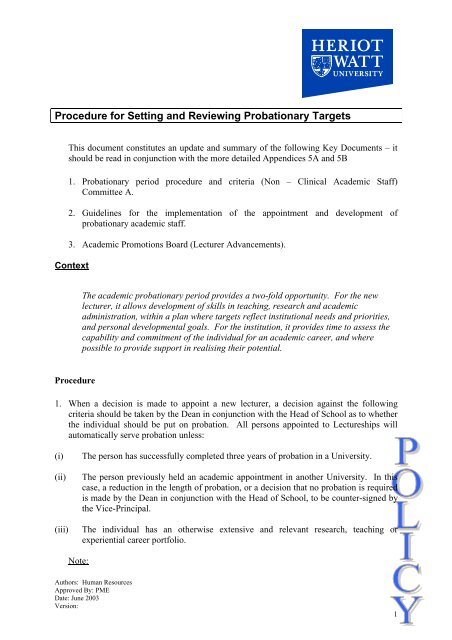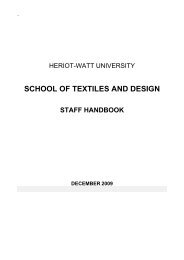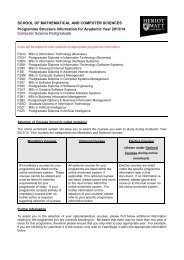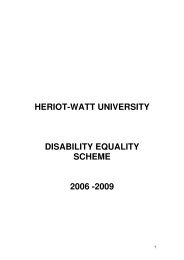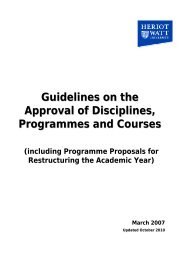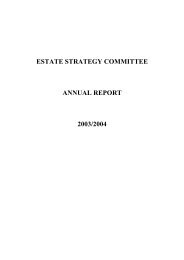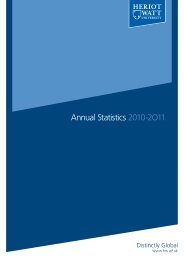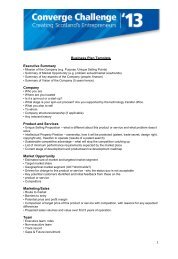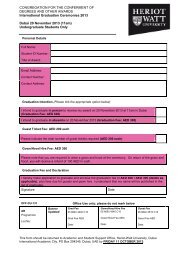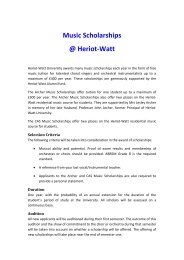Document in Microsoft Internet Explorer
Document in Microsoft Internet Explorer
Document in Microsoft Internet Explorer
You also want an ePaper? Increase the reach of your titles
YUMPU automatically turns print PDFs into web optimized ePapers that Google loves.
Procedure for Sett<strong>in</strong>g and Review<strong>in</strong>g Probationary Targets<br />
This document constitutes an update and summary of the follow<strong>in</strong>g Key <strong>Document</strong>s – it<br />
should be read <strong>in</strong> conjunction with the more detailed Appendices 5A and 5B<br />
1. Probationary period procedure and criteria (Non – Cl<strong>in</strong>ical Academic Staff)<br />
Committee A.<br />
2. Guidel<strong>in</strong>es for the implementation of the appo<strong>in</strong>tment and development of<br />
probationary academic staff.<br />
3. Academic Promotions Board (Lecturer Advancements).<br />
Context<br />
The academic probationary period provides a two-fold opportunity. For the new<br />
lecturer, it allows development of skills <strong>in</strong> teach<strong>in</strong>g, research and academic<br />
adm<strong>in</strong>istration, with<strong>in</strong> a plan where targets reflect <strong>in</strong>stitutional needs and priorities,<br />
and personal developmental goals. For the <strong>in</strong>stitution, it provides time to assess the<br />
capability and commitment of the <strong>in</strong>dividual for an academic career, and where<br />
possible to provide support <strong>in</strong> realis<strong>in</strong>g their potential.<br />
Procedure<br />
1. When a decision is made to appo<strong>in</strong>t a new lecturer, a decision aga<strong>in</strong>st the follow<strong>in</strong>g<br />
criteria should be taken by the Dean <strong>in</strong> conjunction with the Head of School as to whether<br />
the <strong>in</strong>dividual should be put on probation. All persons appo<strong>in</strong>ted to Lectureships will<br />
automatically serve probation unless:<br />
(i)<br />
(ii)<br />
(iii)<br />
The person has successfully completed three years of probation <strong>in</strong> a University.<br />
The person previously held an academic appo<strong>in</strong>tment <strong>in</strong> another University. In this<br />
case, a reduction <strong>in</strong> the length of probation, or a decision that no probation is required<br />
is made by the Dean <strong>in</strong> conjunction with the Head of School, to be counter-signed by<br />
the Vice-Pr<strong>in</strong>cipal.<br />
The <strong>in</strong>dividual has an otherwise extensive and relevant research, teach<strong>in</strong>g or<br />
experiential career portfolio.<br />
Note:<br />
Authors: Human Resources<br />
Approved By: PME<br />
Date: June 2003<br />
Version:<br />
1
Senior Appo<strong>in</strong>tments are not normally subject to probation. However, <strong>in</strong> exceptional<br />
cases the Dean <strong>in</strong> conjunction with the Head of School may recommend that<br />
probation be served.<br />
Fixed Term contracts: Individuals appo<strong>in</strong>ted to full Lectureships but on a fixed term<br />
basis will normally be treated as on probation for the duration of their contract,<br />
although the probationary period will not normally exceed three years (not <strong>in</strong>clud<strong>in</strong>g<br />
any periods of maternity leave, sickness absence or leave of absence).<br />
Where the person appo<strong>in</strong>ted has previously held a full-time academic appo<strong>in</strong>tment <strong>in</strong><br />
another university, the Dean shall decide any reduction <strong>in</strong> the length of the<br />
probationary period. When the person has successfully completed three years of<br />
probation, then there will be no further need to serve a probationary period.<br />
This will <strong>in</strong>clude the requirement for targets to be set for the period of the<br />
appo<strong>in</strong>tment and for attendance at the PG CAP. If the <strong>in</strong>dividual is later made<br />
permanent, their service on a fixed term contract will be taken <strong>in</strong>to account towards<br />
completion of probation.<br />
2. On appo<strong>in</strong>tment the follow<strong>in</strong>g paragraph is <strong>in</strong>cluded <strong>in</strong> the conditions of employment<br />
statement:<br />
Probationary Period<br />
To be offered confirmation of employment the University shall normally be satisfied<br />
that the member of staff: -<br />
• has satisfactorily engaged <strong>in</strong> the teach<strong>in</strong>g of prescribed courses and the<br />
supervisory and tutorial work assigned to him or her.<br />
• has satisfactorily engaged <strong>in</strong> research towards the advancement of his or her<br />
subject, or where appropriate has achieved the completion of a research degree.<br />
• has conscientiously carried out such exam<strong>in</strong><strong>in</strong>g duties and satisfactorily<br />
performed such adm<strong>in</strong>istrative duties as have been required of him or her.<br />
• shows promise by his or her work and enterprise of cont<strong>in</strong>u<strong>in</strong>g to develop as a<br />
university teacher and scholar<br />
• has attended the Postgraduate Certificate <strong>in</strong> Academic Practice.<br />
A copy of the document Guidel<strong>in</strong>es for the implementation of the appo<strong>in</strong>tment and<br />
development of Probationary academic staff is attached and is part of the<br />
conditions of employment.<br />
3. On commencement of appo<strong>in</strong>tment, The Human Resources Department shall <strong>in</strong>form the<br />
relevant Dean.<br />
4. As part of the conditions of appo<strong>in</strong>tment, the Dean, <strong>in</strong> consultation with the Head of<br />
School, should set broad targets that are to be achieved over the three year period for<br />
satisfactory completion of probation. These should be so constructed as to enable the<br />
<strong>in</strong>dividual to achieve balanced professional development and comply with the<br />
requirements of their contract.<br />
Authors: Human Resources<br />
Approved By: PME<br />
Date: June 2003<br />
Version:<br />
2
i) In sett<strong>in</strong>g probationary targets, consideration will be given to ensur<strong>in</strong>g the allocation<br />
of appropriate: teach<strong>in</strong>g duties; co-supervision of Postgraduates; and m<strong>in</strong>or<br />
adm<strong>in</strong>istrative responsibilities (e.g. a probationer would not normally be expected to<br />
be a Course Director).<br />
ii)<br />
iii)<br />
iv)<br />
The Dean, aga<strong>in</strong> <strong>in</strong> consultation with the Head of School, should also set detailed<br />
targets for the first year of probation. At the end of each year detailed targets will be<br />
reviewed with<strong>in</strong> the School <strong>in</strong> the context of the <strong>in</strong>itial plan, personal performance<br />
and development, and School priorities and needs.<br />
Initial and broad targets, along with notification of the mentor, should be provided by<br />
the Dean to the Director of Human Resources as soon as possible after the<br />
appo<strong>in</strong>tment of the lecturer, and with<strong>in</strong> three months of the date of commencement.<br />
The Director of Human Resources will then write formally to each <strong>in</strong>dividual<br />
lecturer, ensur<strong>in</strong>g they are aware that these targets form part of their contract.<br />
v) The Director of Human Resources will confirm targets and guidel<strong>in</strong>es to the<br />
nom<strong>in</strong>ated Mentor.<br />
vi)<br />
The agreed broad and detailed targets should be communicated to the Academic<br />
Promotions Board (Lecturer Advancements) by the Director of Human Resources as<br />
part of the first annual review of the staff member concerned.<br />
5. The Director of Human Resources shall request Heads of School to:<br />
(i)<br />
(ii)<br />
(iii)<br />
(iv)<br />
N.B.<br />
Submit an annual statement of the progress of each lecturer on probation aga<strong>in</strong>st the<br />
agreed criteria and targets set.<br />
For each lecturer who will reach the date of contractual completion of probation<br />
with<strong>in</strong> the succeed<strong>in</strong>g six-month period, a positive or negative recommendation about<br />
completion of probation with reasons.<br />
Notification to the Deans and Heads of School of imm<strong>in</strong>ent completion of the<br />
probationary period will take place not less than six months prior to completion.<br />
Conditional prior approval of completion by the review board may not exceed six<br />
months<br />
The review board will meet twice annually to consider probationary reports and<br />
completion of probation. Reports will only be submitted once per year for each<br />
<strong>in</strong>dividual. The first probationary report for any <strong>in</strong>dividual should be submitted not<br />
less than 11 months from commencement of probation, and should not exceed 17<br />
months – these periods be<strong>in</strong>g determ<strong>in</strong>ed by the timetable<strong>in</strong>g of review board<br />
meet<strong>in</strong>gs.<br />
6. The Director of Human Resources shall send for each lecturer on probation copies of any<br />
previous statements by the Head of School about the lecturer’s progress along with the<br />
statements and recommendations for that year, to the Academic Promotions Board<br />
(Lecturer Advancements).<br />
Authors: Human Resources<br />
Approved By: PME<br />
Date: June 2003<br />
Version:<br />
3
7. Criteria for successful completion of probation.<br />
For a person to be offered confirmation of employment, the University shall be satisfied<br />
that the criteria laid down <strong>in</strong> the conditions of employment statement and all targets set<br />
have been met. Positive or negative recommendations about every lecturer at the end of<br />
his or her probationary period are made to PME on a six monthly basis.<br />
8. The Director of Human Resources will notify the decision of the PME to the lecturer, and<br />
the Head of School. Confirmation of completed probation will be notified concurrently<br />
with confirmation of employment.<br />
9. Procedure for deal<strong>in</strong>g with a failure to meet probationary requirements:<br />
If the Academic Promotions Board (Lecturer Advancements) does not recommend<br />
completion of probation, the Director of Human Resources, outl<strong>in</strong><strong>in</strong>g the reasons for this<br />
decision, will formally write to the <strong>in</strong>dividual. In most cases a further f<strong>in</strong>al year of<br />
probation can be agreed, dur<strong>in</strong>g which the Head of School and Dean will work with the<br />
<strong>in</strong>dividual <strong>in</strong> sett<strong>in</strong>g targets and monitor<strong>in</strong>g progress. It will be made clear to the<br />
<strong>in</strong>dividual that this is a f<strong>in</strong>al extension of probation and that failure to meet targets set<br />
could lead to dismissal from post. The <strong>in</strong>dividual will have a right of appeal aga<strong>in</strong>st the<br />
decision that he/she has not completed probation. In the event of a failure to complete<br />
probation as a result of the extension, proceed<strong>in</strong>gs <strong>in</strong> relation to term<strong>in</strong>ation of<br />
employment will be <strong>in</strong>itiated under Statute XXV.<br />
Authors: Human Resources<br />
Approved By: PME<br />
Date: June 2003<br />
Version:<br />
4
APPENDIX 5A<br />
Guidel<strong>in</strong>es for the implementation of the appo<strong>in</strong>tment and development of<br />
probationary academic staff<br />
Preamble<br />
In 1971 the Academic and Related Salaries settlement <strong>in</strong>cluded an agreement on the probationary<br />
period for Lecturers. A work<strong>in</strong>g party of the then Committee "A" resulted <strong>in</strong> the Probationary<br />
Period Agreement which is reproduced as Appendix 5 <strong>in</strong> the Staff Handbook.<br />
Certa<strong>in</strong> of the references <strong>in</strong> that agreement are now out-of-date, but the <strong>in</strong>tention of this paper is<br />
not to up-date that document but simply to make clearer what is expected of a probationary<br />
lecturer, and the support and assistance he or she may expect from the University.<br />
Introduction<br />
The ma<strong>in</strong> aim of the probationary period, which perhaps has become obscured, is to ensure the<br />
permanent appo<strong>in</strong>tment of academic staff eventually capable of the highest quality <strong>in</strong> both<br />
teach<strong>in</strong>g and research, and competent <strong>in</strong> academic adm<strong>in</strong>istration. Care must therefore be<br />
taken to protect probationary staff from duties or tasks that detract effort away from<br />
develop<strong>in</strong>g and demonstrat<strong>in</strong>g emergent abilities <strong>in</strong> these crucial areas.<br />
The probationary period is normally a total of three years (concurrent periods of maternity leave,<br />
sickness absence or leave of absence should not be counted as part of the probationary period).<br />
Where the person appo<strong>in</strong>ted has previously held a full-time permanent academic appo<strong>in</strong>tment <strong>in</strong><br />
another university, the Dean shall decide any reduction <strong>in</strong> the length of the probationary period.<br />
When the person has successfully completed three years of probation, then there will be no<br />
further need to serve a probationary period.<br />
Discretion may also be applied <strong>in</strong> cases where an extensive and relevant research, teach<strong>in</strong>g or<br />
experiential career portfolio can be adequately demonstrated.<br />
Appo<strong>in</strong>tment<br />
In order to achieve the objective, referred to above, the follow<strong>in</strong>g procedures will be followed:<br />
1 The Head of School, <strong>in</strong> consultation with the Dean, normally should approve for <strong>in</strong>itial<br />
appo<strong>in</strong>tment only those already <strong>in</strong> possession of a PhD or who are <strong>in</strong> the f<strong>in</strong>al stages of<br />
submission of a thesis and whose Head of School/Supervisor has supplied written<br />
confirmation that success is highly likely.<br />
When a School wishes to appo<strong>in</strong>t without this qualification then a special case must be made<br />
to the Pr<strong>in</strong>cipal/Vice-Pr<strong>in</strong>cipal via the Dean, stat<strong>in</strong>g the extenuat<strong>in</strong>g circumstances and list<strong>in</strong>g<br />
all other candidates for the post. If the appo<strong>in</strong>tment proceeds, then the staff member must<br />
immediately register and embark on study for a higher research degree.<br />
[A PhD as usual is <strong>in</strong>tended to be synonymous with an active research record.]<br />
2 The Dean and Head of School should be satisfied that the person is active <strong>in</strong> research; has<br />
reasonable presentation skills; a sound grasp of the subjects likely to be taught <strong>in</strong> the first<br />
few years; a general understand<strong>in</strong>g of the standards required and of current developments<br />
Authors: Human Resources<br />
Approved By: PME<br />
Date: June 2003<br />
Version:<br />
5
<strong>in</strong> University education; and has considered the merits or otherwise of <strong>in</strong>novative<br />
teach<strong>in</strong>g techniques.<br />
3 As part of the conditions of appo<strong>in</strong>tment, the Dean, <strong>in</strong> consultation with the Head of<br />
School, should set broad targets that are to be achieved over the three year period<br />
for satisfactory completion of probation. These should be so constructed as to enable<br />
the <strong>in</strong>dividual to achieve balanced professional development and comply with the<br />
requirements of their contract.<br />
4 Such targets should <strong>in</strong>volve teach<strong>in</strong>g, research and tra<strong>in</strong><strong>in</strong>g but may also <strong>in</strong>clude m<strong>in</strong>or<br />
adm<strong>in</strong>istrative tasks. They must, however, exclude all major adm<strong>in</strong>istrative functions<br />
such as course director, admissions tutor, or exam<strong>in</strong>ations officer. The aim of this<br />
provision is to ensure that the probationer's teach<strong>in</strong>g and research goals are achievable.<br />
5 The Dean, aga<strong>in</strong> <strong>in</strong> consultation with the Head of School, should also set detailed<br />
targets for the first year of probation. At the end of each year detailed targets will be<br />
reviewed with<strong>in</strong> the School <strong>in</strong> the context of the <strong>in</strong>itial plan, personal performance<br />
and development, and School priorities and needs.<br />
6 Initial targets should be agreed and provided to the Director of Human Resources as soon<br />
as possible after the appo<strong>in</strong>tment of the lecturer, and with<strong>in</strong> three months of the date of<br />
commencement.<br />
7 The Director of Human Resources will then write formally to each <strong>in</strong>dividual lecturer,<br />
ensur<strong>in</strong>g they are aware that these targets form part of their contract.<br />
The agreed broad and detailed targets should be communicated to the Academic<br />
Promotions Board (Lecturer Advancements) by the Director of Human Resources as part<br />
of the first annual review of the staff member concerned.<br />
Development<br />
In consultation with the Head of School, the Dean shall appo<strong>in</strong>t a senior academic staff member<br />
of the School (a Mentor) who shall be responsible for offer<strong>in</strong>g advice and guidance on the<br />
performance of duties to the probationary member throughout the probationary period.<br />
The Mentor should also monitor the probationer's progress and report annually to the Academic<br />
Promotions Board (Lecturer Advancements).<br />
The Academic Promotions Board (Lecturer Advancements) as part of the annual review should<br />
consider the development and progress of each staff member on probation and issue notification<br />
<strong>in</strong> writ<strong>in</strong>g to the member, the Head of School and the Mentor of satisfactory or unsatisfactory<br />
development, performance or conduct. The report should state progress aga<strong>in</strong>st <strong>in</strong>itial<br />
probationary targets to be achieved dur<strong>in</strong>g the ensu<strong>in</strong>g year and any remedial steps required.<br />
When necessary the report should provide advance notice that the position is unlikely to be<br />
confirmed.<br />
Authors: Human Resources<br />
Approved By: PME<br />
Date: June 2003<br />
Version:<br />
6
Assistance from the University<br />
Probationers are expected to attend part or all of the Postgraduate Certificate <strong>in</strong> Academic<br />
Practice programme, organised by Human Resources Department. It is believed considerable<br />
benefits come from probationers be<strong>in</strong>g able to meet and share experiences. These facilities will<br />
also be organised.<br />
The <strong>in</strong>dividual can approach his or her Mentor for any guidance or help, <strong>in</strong>dependent of the Head<br />
of School, if appropriate, and can also seek assistance from the HR Department for teach<strong>in</strong>g and<br />
learn<strong>in</strong>g guidance.<br />
The <strong>in</strong>dividual may also at any time contact the Dean for assistance <strong>in</strong> any matter related to their<br />
probation and academic development.<br />
Criteria for the satisfactory completion of probation<br />
For a person to be offered confirmation of employment, the University shall be satisfied that<br />
hav<strong>in</strong>g regard to his or her age, stand<strong>in</strong>g, experience, and to the opportunities which he or she has<br />
been offered:<br />
1 he or she has satisfactorily engaged <strong>in</strong> the teach<strong>in</strong>g of prescribed courses and the<br />
supervisory and tutorial work assigned to him or her<br />
2 he or she has satisfactorily engaged <strong>in</strong> research towards the advancement of his or her<br />
subject, or where appropriate has achieved the completion of a research degree.<br />
3 he or she has conscientiously carried out such exam<strong>in</strong><strong>in</strong>g duties and satisfactorily<br />
performed such adm<strong>in</strong>istrative duties as have been required of him or her<br />
4 he or she shows promise by his or her work and enterprise of cont<strong>in</strong>u<strong>in</strong>g to develop as a<br />
university teacher and a scholar<br />
5 he or she attends PG CAP. Attendance on this programme will lead to membership of the<br />
Institute for Learn<strong>in</strong>g and Teach<strong>in</strong>g.<br />
Authors: Human Resources<br />
Approved By: PME<br />
Date: June 2003<br />
Version:<br />
7
THE ROLE OF THE ACADEMIC MENTOR<br />
APPENDIX 5B<br />
1 The position of the Academic Mentor arises from the current national collective<br />
agreement on Probationary Staff (reproduced as an Appendix of the Staff Handbook)<br />
which provides that where an appo<strong>in</strong>tment is made for a probationary period the<br />
University must provide for the probationer tra<strong>in</strong><strong>in</strong>g of a helpful and comprehensive<br />
nature and this is to <strong>in</strong>clude advice and guidance by a senior colleague nom<strong>in</strong>ated (by<br />
the Head of School) for this task.<br />
2 In 1995 the University clarified the support and assistance the Probationer may expect<br />
by publish<strong>in</strong>g a document 'Guidel<strong>in</strong>es for the implementation of the appo<strong>in</strong>tment and<br />
development of probationary academic staff'.<br />
3 The Guidel<strong>in</strong>es require the Dean <strong>in</strong> consultation with the Probationer's Head of School<br />
to appo<strong>in</strong>t as Mentor a senior academic staff member of the School.<br />
The Head of School should not normally act as a mentor to any member of their<br />
School staff.<br />
As the relationship between Mentor and Probationer is based on trust and confidence<br />
it is essential that both Mentor and Probationer are consulted before a mentor<strong>in</strong>g<br />
appo<strong>in</strong>tment is made and should it be necessary either is free to ask the Dean to<br />
appo<strong>in</strong>t another Mentor after consult<strong>in</strong>g the relevant Head of School. A Mentor should<br />
be appo<strong>in</strong>ted with<strong>in</strong> three months of the Probationer commenc<strong>in</strong>g but it may be useful<br />
to allow a newly appo<strong>in</strong>ted Probationer time to get to know senior staff before<br />
nom<strong>in</strong>at<strong>in</strong>g a Mentor.<br />
4 On appo<strong>in</strong>tment a Mentor should ensure that he/she is familiar with the conditions<br />
which require to be met for satisfactory completion of probation and where appropriate<br />
for progression up the lecturer scale. The relevant criteria are set out <strong>in</strong> the Staff<br />
Handbook.<br />
5 The role of the Mentor must not be confused with that of a Probationer's Reviewer.<br />
The Mentor is responsible for offer<strong>in</strong>g supportive advice and guidance on the<br />
performance of duties to the Probationer throughout the probationary period. For this<br />
purpose the mentor and Probationer may wish to make use of the help available from<br />
the Director of Staff Learn<strong>in</strong>g and Development. The Reviewer may be the Head of<br />
School or a senior member of staff to whom this responsibility has been appropriately<br />
delegated.<br />
6 The Mentor is required to make a factual progress report annually to the Academic<br />
Promotions Board (Lecturer Advancements) which <strong>in</strong> turn is required to notify the<br />
Mentor of satisfactory or unsatisfactory development, performance or conduct by the<br />
Probationer.1 This report will normally be copied to the Head of School for <strong>in</strong>formation.<br />
It would be <strong>in</strong> keep<strong>in</strong>g with the spirit of the relationship between Mentor and<br />
Probationer for such a report to be <strong>in</strong> terms acceptable to both parties.<br />
7 The precise relationship between Mentor and Probationer may vary considerably<br />
depend<strong>in</strong>g on the Probationer's previous experience, age and qualifications but a<br />
Mentor would normally be expected to arrange to meet with a Probationer at least<br />
three times <strong>in</strong> the academic year (normally once per academic term) with one of the<br />
meet<strong>in</strong>gs be<strong>in</strong>g timed to allow the Mentor to make an up-to-date written report to the<br />
Academic Promotions Board (Lecturer Advancements).<br />
Authors: Human Resources<br />
Approved By: PME<br />
Date: June 2003<br />
Version:<br />
8
8 The objectives of the Head of School, the Probationer and the Mentor are of course<br />
the satisfactory completion of probation but while the Head of School is responsible for<br />
the management of the lecturer's probationary period - by, for example, ensur<strong>in</strong>g the<br />
Probationer is excused major School and adm<strong>in</strong>istrative functions such as admissions<br />
officer or exam<strong>in</strong>ations officer - the Mentor's role is to use his or her own experience<br />
and knowledge to give advice and support to the Probationer and while a Probationer<br />
may seek help and guidance from other staff as appropriate the follow<strong>in</strong>g are examples<br />
of how a Mentor may be able to assist:<br />
Teach<strong>in</strong>g<br />
• discuss<strong>in</strong>g the preparation of lectures<br />
• observ<strong>in</strong>g a lecture when requested to do so by the Probationer<br />
• <strong>in</strong> consultation with Head of School, advis<strong>in</strong>g on curriculum development<br />
• respond<strong>in</strong>g to student evaluation questionnaires<br />
• prepar<strong>in</strong>g and mark<strong>in</strong>g exam<strong>in</strong>ations and assessments<br />
• deal<strong>in</strong>g with group projects and <strong>in</strong>novative teach<strong>in</strong>g methods<br />
• identify<strong>in</strong>g literature which may assist Probationer 2<br />
Research<br />
• develop<strong>in</strong>g a research competence/programme<br />
• advis<strong>in</strong>g on sources of materials<br />
• obta<strong>in</strong><strong>in</strong>g fund<strong>in</strong>g<br />
• advis<strong>in</strong>g on possible contacts for collaborative projects<br />
• writ<strong>in</strong>g proposals<br />
Adm<strong>in</strong>istration<br />
• time management<br />
• deal<strong>in</strong>g with students/mentees<br />
• act<strong>in</strong>g as first source of <strong>in</strong>formation about the University<br />
• conduct<strong>in</strong>g relationship with Head of School and allocation of duties<br />
1 At the time of prepar<strong>in</strong>g this document while some Mentors had been asked to provide<br />
the necessary report they had generally been asked to do so by the Head of School.<br />
However the revised guidel<strong>in</strong>es state that the Mentor should report to the Academic<br />
Promotions Board (Lecturer Advancements); the request for the report should come direct<br />
from the clerk to that Board rather than via the Head of School. Similarly Mentors should<br />
receive the Review Board's notification directly.<br />
2 The Staff Learn<strong>in</strong>g and Development Director holds texts and manuals deal<strong>in</strong>g with a<br />
range of issues frequently encountered by Probationers and other staff who wish to develop<br />
teach<strong>in</strong>g and assessment and a list of the current hold<strong>in</strong>gs is available on the <strong>Internet</strong>.<br />
Authors: Human Resources<br />
Approved By: PME<br />
Date: June 2003<br />
Version:<br />
9


